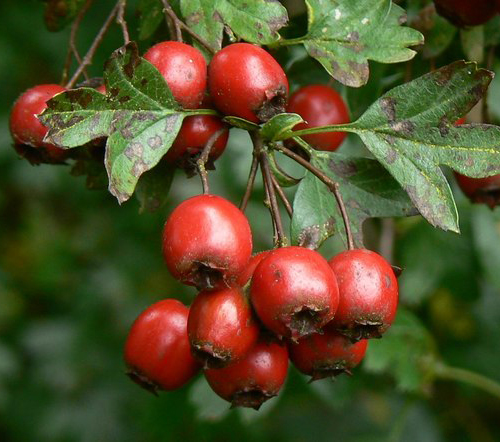Health Benefits of Hawthorn Berries
Hawthorn berry information, FAQ and product listing page. This page contains information and frequently asked questions about hawthorn berry as well as a complete list of products containing hawthorn berry.
Quick jump to the sub-sections on this page:
What is hawthorn berry and what does it do?
Hawthorn (also scientifically known as Crataegus species) is a tiny shrub or tree that is a part of the rose family. In the Middle Ages it was hung over doorways to help deter evil spirits. In the America’s in the 1800’s doctors found some of the herb’s medicinal advantages – treatment of circulatory disorders and respiratory illnesses began with hawthorn berry.
The hawthorn berry is concerned to be a “cardiotonic” type of herb or tonic, with the berries and flowers of the hawthorn plant being used to treat heartbeats that were irregular, high blood pressure, chest pain, heart failure, and hardening of the arteries. This is why the hawthorn plant is commonly used to improve the strength of the heart.
What are the benefits of taking hawthorn berry?
Centuries away from it’s original use of deterring evil spirits, a lot of medical professionals prescribe hawthorn to help in the fight against heart disease. In addition, it’s used to keep blood pressure at a minimum, as well as high cholesterol.
Heart failure – The primary focus of hawthorn to combat heart related illnesses. Many studies have been performed that have study the effects of hawthorn berry on patients with heart failure – heart failure being described as the situation in which the heart is unable to pump enough blood around the body. A total of 4 studies have shown that hawthorn berry has been able to drastically improve heart function. Hawthorn has also been able to increase a patient of heart failure’s ability to exercise.
One study that was performed showed that 900 milligrams of hawthorn extract a day, if taken for 2 months, was nearly if not as effective as a leading heart medication, capropril, when it came to improving symptoms of heart failure.
Today, many health care professionals use hawthorn to help protect against heart disease and help control high blood pressure and high cholesterol.
Atherosclerosis – Studies have shown that the hawthorn plant contains some antioxidant properties that are beneficial in helping protect against the creation of plaques. This refers to the build up of fatty platelets and materials inside blood vessels, potentially causing a stroke – also known as atherosclerosis. Buildup of plaque along the vessel walls will thin out the oxygen-rich blood that the heart receives, causing angina (chest pain), and eventually heart attacks. Plaque that builds up within the brain has the ability to cause a stroke.
Chest pain – Preparations of hawthorn berry have demonstrated the ability to help fight angina. One study has showed that 60 patients diagnosed with angina were given a placebo or 180 milligrams of hawthorn berry extract for 3 weeks – the individuals that received the preparation of hawthorn were able to exercise longer due to improved blood flow to the heart.
Who can benefit from taking hawthorn berry?
Individuals that were diagnosed with a myriad of heart related conditions may possibly benefit from supplementing with hawthorn berry. However, hawthorn berry should never be taken in substitute of proper professional medical help and diagnosis. If you believe you have a heart related medical condition and have yet to seek treatment or diagnosis, please do so immediately.
How much hawthorn berry should I take?
There are no studies showing the effects of hawthorn berry usage in pediatrics. Therefore, it should not be taken by children unless otherwise prescribed.
To decrease symptoms of heart failure in adults you should take 160-900 milligrams daily for at least 6 weeks, standardized to 2-3% flavonoids or 18-20% oligomeric procyanidins. Alternatively, 120-240 milligrams 3 times a day for at a minimum of 6 weeks, standardized to 1.8% vitexin rhamnoside and 10%. Of course, always follow the label directions found on the supplement you’re taking.
Does hawthorn berry have any side effects?
The American Herbal Products Association (AHPA) grants hawthorn with a class 1 safety rating, which basically means that it’s one of the safest herbs on the market. While side effects are rare, they may occur and can include nausea, palpitations, and a headache.
Original Article: http://www.muscleandstrength.com/supplements/ingredients/hawthorn-berry.html



